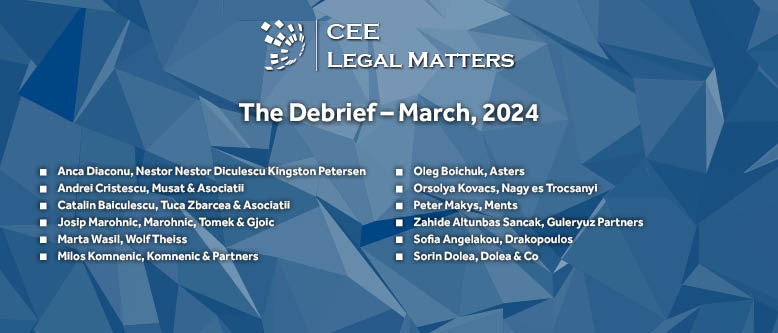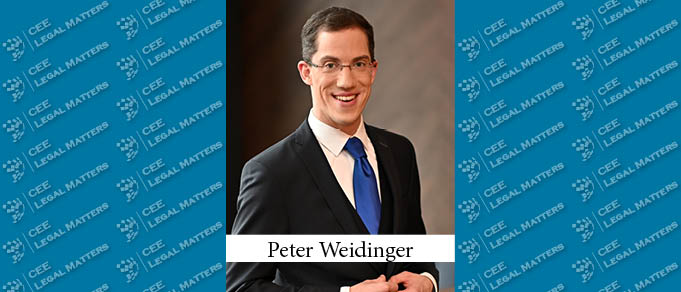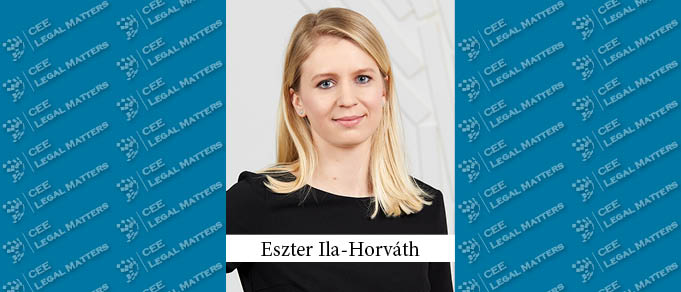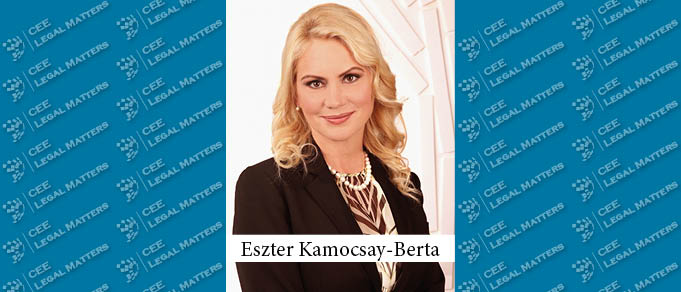Deloitte Legal has advised IPCOM on the acquisition of Hungary's Dualinvest.
The Debrief: March 2024
In The Debrief, our Practice Leaders across CEE share updates on recent and upcoming legislation, consider the impact of recent court decisions, showcase landmark projects, and keep our readers apprised of the latest developments impacting their respective practice areas.
The Corner Office: 2024 Wishes and Perils
In The Corner Office, we ask Managing Partners at law firms across Central and Eastern Europe about their backgrounds, strategies, and responsibilities. As we bid farewell to 2023, this time around we turn our attention forward: What is your one main wish for 2024 and what do you see as the biggest potential risk?
Looking In: Interview with Jonathan Marks and Richard Jones of Slaughter and May
In our Looking In series, we talk to Partners from outside CEE who are keeping an eye on the region (and often pop up in our deal ticker) to learn how they perceive CEE markets and their evolution. For this issue, we sat down with Slaughter and May Partners Jonathan Marks and Richard Jones.
Hungary: A General Overview of the Current Solutions for Insolvency in Hungarian Law
If someone is unable to pay their outstanding and due debts (or is just partly able to do so), that person is considered insolvent. This applies to companies and to natural persons as well. The number of companies that had to cease operations because of insolvency increased in 2023. Although the Hungarian legal environment provides several solutions to this problem, these have different effectiveness and have different consequences for both debtors and creditors. Below is a general overview of the four typical procedures for dealing with insolvency in the current Hungarian law.
Fake Environmental Awareness, or the “Green Washing” Phenomenon According to the Hungarian Competition Authority
Today, more and more companies are trying to convince consumers with the pretence of a sustainable future and environmental awareness. However, in many cases, there is no real responsibility behind such marketing activities, which are simply intended as an effective advertising ploy to make green claims.
Stages of entry into force of the Hungarian Architecture Act
The Hungarian Parliament adopted the bill on Hungarian architecture on 12 December 2023, and the Hungarian Architecture Act was officially published 10 days later. The date of entry into force is different for certain sections of the Act, namely 30 December 2023, 1 October 2024, 1 January 2026 and finally 1 July 2027.
The Hungarian ESG Act Has Arrived
Due to the holiday season and the legislative dumping at the end of the year, the important new milestone in the ESG field did not receive much publicity, even though Act CVIII of 2023, the ESG Act, which is the first comprehensive Hungarian regulation in the field, entered into force as of January 1, 2024. The field, which until now has mostly been covered by EU sources of law and in one Hungarian law, has finally ceased to be a stepchild and has been given the first comprehensive and unified law, which the legislator himself named the ESG Act.
New Obligation for Waste Producing Companies: The Compulsory Environmental Insurance
The new provisions on compulsory environmental insurance entered into force on 1 January 2024 through the modification of the Waste and a new Government Decree.
Powers of Conciliation Boards Extended from January 1
Under Hungarian law, conciliation boards were set up more than two decades ago, which provide a fast, efficient and inexpensive forum for dispute resolution compared to litigation in specific cases. The competence of the conciliation boards in relation to goods and services covers (i) the quality and safety of the services; (ii) application of product liability rules; and (iii) conclusion and performance of contracts. This type of conciliation can only be initiated by the consumer as an individual.
New Allowances in Corporate Taxation
From 1 January 2024, taxpayers can benefit from a tax allowance for investments in the construction of electricity storage facilities. The tax allowance is available for 6 tax years, with the first tax year being either the year of installation or the following tax year, at the taxpayer's option. This incentive is intended to encourage the installation of new electricity storage facilities which enable the taxpayer to store electricity generated for its own use.
BSRP Advises E.On Drive Infrastructure on Establishing Hungarian Electro-Mobility Charging Network
Ban, S. Szabo, Rausch & Partners has advised E.On Drive Infrastructure on establishing a new Hungarian subsidiary and acquiring the electro-mobility charging infrastructure from E.ON Hungaria, to continue operating as a stand-alone network in Hungary.
Latest Changes to Personal Income Allowances
Starting on 1 January 2024, a new feature was launched regarding personal income allowances, meaning that certain tax base reduction allowances can also be claimed on a continuing basis. The purpose of the existing tax advance return is to allow the employer to determine and deduct the tax advance, considering both benefits and costs.
Legal Considerations for Investing in Generative AI in Hungary — A dilemma of Data and Authorship
Nowadays, one can hear a lot about generative artificial intelligence ("Generative AI"), which can be used to create different types of content (e.g., text, images, software source code) in an automated way by giving simple instructions (so-called "prompts"). Companies may reasonably ask whether it is worth investing, at this point, in software using Generative AI; however, the current Hungarian legislative environment does not provide answers to this question, which could clearly provide guidance in all cases, on a general basis. For this reason, the legal implications of each investment (be it either procurement or "in-house" development) need to be examined on a case-by-case basis.
A Proposal Made by the Government for Preferential Taxation of "Digital" Companies Employing Foreign Workers
According to a draft legislation on digital companies issued at the end of 2023, “digital companies” would be exempt from paying public burdens and local business tax. Employees in employment relationships and the executives of companies could fulfil their tax payment obligations after their income through special public burden contributions.
Wolf Theiss Advises Uniper on Sale of Hungarian Combined-Cycle 430-Megawatt Gas Power Plant to Veolia
Wolf Theiss has advised Uniper on the sale of the Gonyu gas-fired combined-cycle 430-megawatt power plant to Veolia. BDO Legal Hungary and Cleary Gottlieb reportedly advised Veolia.
Platform Workers are Not Employees, Hungarian Curia Confirms
The legal status of platform workers (e.g. food couriers) is continuously subject to interpretation and often times scrutiny from the authorities. The Hungarian Curia settled the status in its latest decision, at least from a labour law point of view.
CMS and Filip & Company Advise on Banca Transilvania Purchase of OTP Bank Romania
CMS has advised the OTP Group on the binding agreement to sell its stake in OTP Bank Romania and all subsidiaries to Banca Transilvania for a combined purchase price is EUR 347.5 million. Filip & Company advised Banca Transilvania on the acquisition.




















